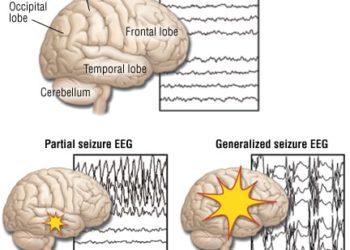Dietary interventions effective in treating pediatric drug-resistant epilepsy
1. In a systematic review and meta-analyses of dietary interventions for drug-resistant epilepsy in children, the ketogenic diet, modified Atkins diet, and low glycemic index therapy led to a 50-90% reduction in seizure activity from baseline in the short-term period.
2. Of the dietary interventions, the modified Atkins diet may be the most suitable intervention with larger reductions in seizure activity (up to 100% reduction in the short term), and the least withdrawals from therapy due to adverse events compared to other dietary interventions.
Evidence Rating Level: 1 (Excellent)
Study Rundown: Drug-resistant epilepsy (DRE; failure of more than 2 therapies) has limited therapeutic options. Aside from epilepsy surgery, many children with DRE are treated with dietary therapies such as the ketogenic diet (KD), modified Atkins diet (MAD), and low glycemic index therapy (LGIT). Despite advances in dietary interventions, there is limited research available comparing different modalities. To address this shortcoming, researchers conducted a systematic review of randomized controlled trials comparing dietary therapies including KD, MAD, and LGIT. Meta-analysis revealed that these interventions were better than usual care in the short-term period for reducing 50-90% of seizure activity, and KD and MAD interventions were better than usual care for achieving 100% seizure reduction from baseline in the short-term (3 months) period. There was a trend toward 50% seizure reduction in the intermediate and long-term periods, but the dietary interventions were not different from usual care in these follow-up periods for 90-100% seizure reduction. Adverse events were more likely to lead to withdrawal of therapy in KD and MAD treatments over usual care and had a more pronounced effect with KD therapy. In general, this study shows that dietary interventions are effective in reducing seizure burden in the short-term period. Additional studies are required to directly compare different dietary interventions and assess intermediate and long-term efficacy.
Click here to read the article in JAMA Pediatrics
Relevant Reading: Ketogenic diet for the treatment of pediatric epilepsy: review and meta-analysis
In-Depth [systematic review and meta-analysis]: This systematic review included randomized controlled studies from inception until April 2022 treating DRE with KD, MAD, or LGIT in children (age ≤18 years). Primary outcomes included the proportion of participants with 50%+, 90%+, or 100% reduction in seizure frequency in the short-term period, which was defined as 3 months. 676 participants were included in the analysis, with 12 studies included in the efficacy analysis, specifically with 10 for short-term, 4 trials for the intermediate term, and 1 trial for long-term efficacy. In the short term, LGIT (OR, 24.7, 95%CI, 5.3-115.4), MAD (OR, 11.3, 95% CI, 5.1-25.1), and KD (OR 8.6, 95% CI, 3.7- 20.0) all led to reductions in 50% or higher seizure reduction from baseline, although there no differences in the rates of reduction between modalities. There was a trend toward a 50% or greater reduction in seizure activity from baseline in the intermediate (45% participants) and long-term (23.2%) periods for dietary interventions. When assessing the number of participants with 90% or greater reduction in seizure activity in the short-term period, KD (OR 6.5, 95% CI 2.3-18.0), MAD (OR 5.1, 95% CI 2.2-12.0), and LGIT (OR 1.8, 95% CI 0.3-8.8) led to greater reductions than usual care, with no statistical difference between the modalities. Similarly, when comparing 100% seizure reduction from baseline, KD (OR 5.0, 95%CI 1.3-19.5) and MAD (OR 4.4, 95% CI 1.3-14.5) were better than usual care for achieving seizure freedom in the short-term period. Dietary thereapies did not have a benefit over the usual standard of care in the intermediate or long-term periods for either 90%+ or 100% reduction in seizure activity. Six studies assessed safety outcomes. Participants were withdrawn from therapies due to adverse events compared with care as usual for KD (OR 8.6, 95%CI 1.8-40.6), and MAD (OR 6.5, 95% CI, 1.4-31.2). There were no differences between therapies for rates of discontinuation.
Image: PD
©2023 2 Minute Medicine, Inc. All rights reserved. No works may be reproduced without expressed written consent from 2 Minute Medicine, Inc. Inquire about licensing here. No article should be construed as medical advice and is not intended as such by the authors or by 2 Minute Medicine, Inc.







